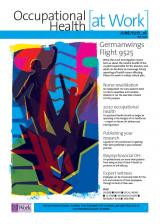June/July 2016 (vol. 13/1)
ContentsFeaturesNewsLegal
NewsResearch DigestResearch PlusCPD
Research Plus
Workplace interventions for depression and anxiety
A meta-review found strong evidence that some workplace interventions can be effective in preventing, treating or rehabilitating individuals with depression or anxiety, but their impact on absence, presenteeism and productivity remains ‘relatively unexplored’. The 140 reviews that were included covered 481 research studies. There was strong evidence that workplace physical activity reduced symptoms, but only limited and conflicting evidence for a positive effect on absence. There was strong evidence that CBT used to treat anxiety and depression reduced symptoms, and moderate evidence that return-to-work programmes incorporating CBT improved occupational outcomes (eg faster return to work). There was also strong evidence that CBT-based stress management programmes reduced symptoms, but no evidence of impact on work outcomes (eg absence and productivity). There was only limited evidence and mixed results for the effectiveness of workplace health promotion; limited evidence of a positive effect on symptoms and occupational outcomes for workplace screening coupled with a secondary intervention (such as CBT); and there was limited evidence for the benefits of counselling on its own. There is strong evidence that exposure therapy can reduce symptoms in people who have developed post-traumatic stress disorder following an occupational injury, and moderate evidence that it can reduce sickness absence in people with anxiety disorders.
Psychological Medicine 2016; 46, 683–697. doi: 10.1017/S0033291715002408
Occupational Health at Work June/July 2016 (vol. 13/1) pp40-41



